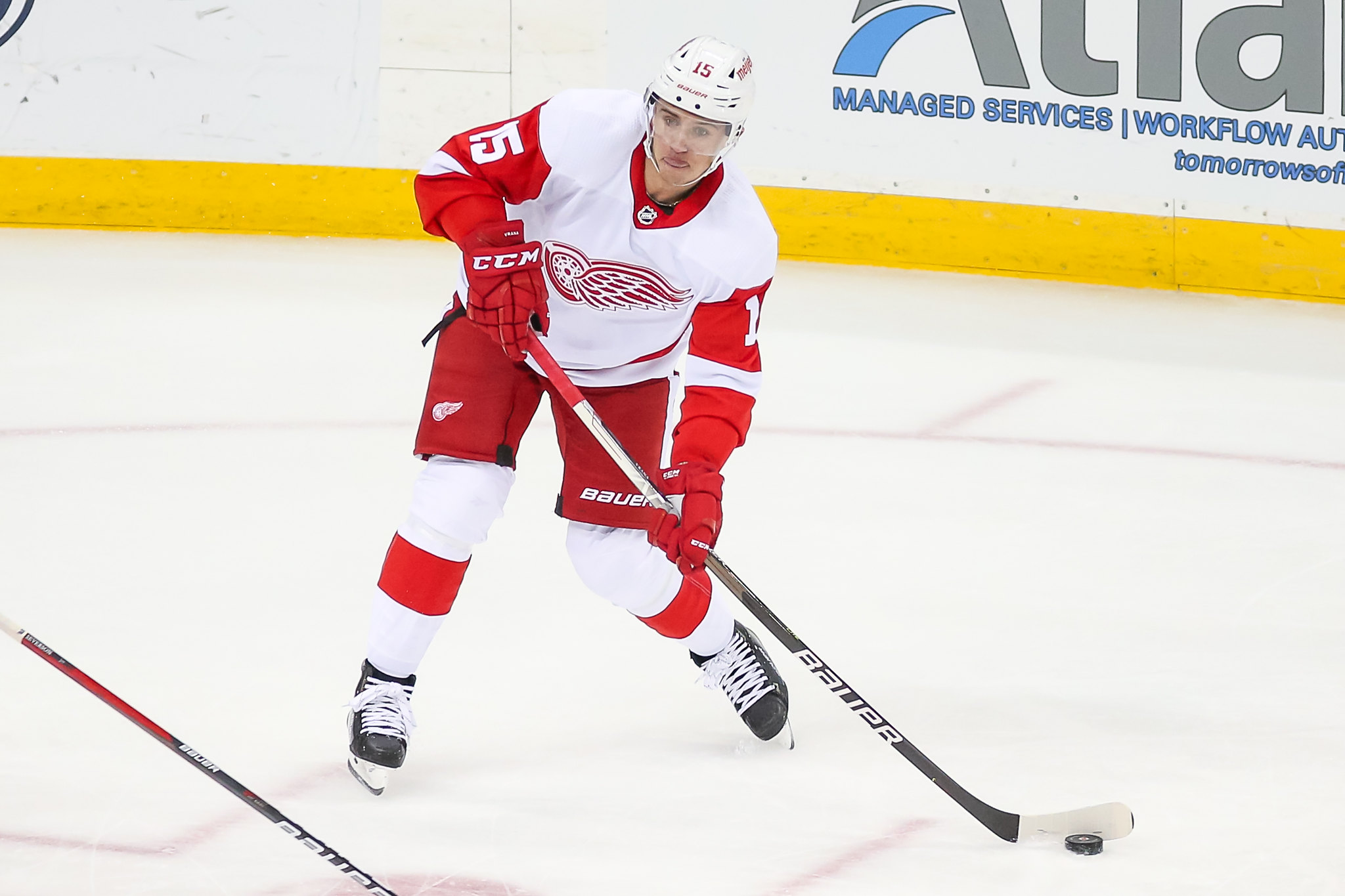This week saw Detroit Red Wings general manager Steve Yzerman do the unthinkable, placing Czechian sniper Jakub Vrana on waivers, free for any NHL team to pick up. The Red Wings fandom was in shambles for exactly 24 hours as it awaited the inevitable announcement of which team decided to take him off waivers.

Instead, fans collectively breathed a massive sigh of relief when it was revealed that Vrana cleared successfully, being passed on by every single NHL team. This move allows Vrana to remain in the American Hockey League (AHL) with the Grand Rapids Griffins for as long as necessary for him to be ready for NHL action again. It’s clear that his current situation as a player returning from the Player Assistance Program in need of some serious conditioning time to get back into NHL shape played a big part in him clearing successfully, but it also reveals a weird truth about the current state of the NHL. Cap space is worth more than goals.
Why was Vrana too Risky for other NHL Teams?
Vrana has proven himself to be a very efficient goal scorer in his career thus far and has mostly been hindered by an inability to stay healthy for a long period of time. When it was announced that he was on waivers, stats nerds (myself included) flocked to our computers to look for a reason that Detroit wouldn’t want him to play for them. What we found instead was a great number of reasons to keep him, and even to give him a bigger role.
From 2019-20 through 2021-22, Vrana had the second highest rate of 5-on-5 goals per 60 minutes of ice time (among players with over 1,000 minutes played), behind only Auston Matthews (via. Natural Stat Trick). That means he has been a more efficient even strength goal scorer than Connor McDavid, David Pastrnak, and even Alex Ovechkin or the last three seasons or so.
Related: Early Look at the 2024 NHL Draft
You don’t let a player of that caliber go for nothing, so it became clear that Steve Yzerman and co. had complete confidence that he would make it through waivers unscathed. Perhaps their reason for believing so was because of some secret NHL GM agreement to not claim players who are finally returning to play from the Players Assistance Program, but I think it’s more likely that he wasn’t picked off waivers because of his contract and the cap struggles that most NHL teams are facing several years into the flat cap era.
Vrana’s contract runs through the 2023-24 season and has a cap hit of $5.25M/year. That is a lot of money to commit to any player on waivers, let alone one that has only managed to play 28 NHL games over the last season and a half. There are very few teams with the kind of cap space necessary to add Vrana off waivers without needing to make several other moves for cap purposes, and even then they clearly weren’t convinced they’d get the full value of Jakub Vrana soon enough for it to be a worthwhile acquisition.
Vrana Isn’t the First Great Winger with Zero Value
In the last year it has become clear to me that scoring wingers have very little trade value, and that additional cap commitments reduce their value further. Oliver Bjorkstrand is a great top-six winger who was a meaningful part of the Columbus Blue Jackets, but he was still traded last summer for just two draft picks (a third and a fourth) to the Seattle Kraken because Columbus was desperate for space to sign Johnny Gaudreau and extend Patrik Laine.

Then we saw Max Pacioretty traded from the Vegas Golden Knights to the Carolina Hurricanes for future considerations despite him coming off a season where he scored 37 points in 39 games and had just one final year on his contract worth $7M. Actually, Pacioretty had negative value as the Golden Knights were forced to sweeten the deal further, adding young defender Dylan Coghlan to make the deal work. This is the current NHL landscape, a six-time 30-goal scorer had negative value simply because he had one more year on his contract with a more than fair cap-hit. Teams have become desperate for cap space and are more wary than ever of committing to inefficient contracts.
How Should Detroit Handle Their Scoring Wingers?
This recent development means that it is likely best for Detroit to hold onto any scoring wingers until at least next season if they are looking to trade them because they are unlikely to net much in return at this point in time.
Related: NHL Draft Rankings – Horn’s Top 32 for December
One such player who has been brought up a lot over the last year or so is Tyler Bertuzzi who doesn’t have a contract past the end of this season. I expect that his injury troubles this year will prevent any team from looking to add him at this year’s trade deadline, but I also don’t see Detroit being super excited about extending him long-term at this point. Unless the Red Wings are prepared for him to walk in free agency, I think the best course of action is another short-term deal, either one or two years, and then they can explore a trade again when the salary cap begins to increase.
David Perron was a great pickup for the Red Wings in free agency last summer, and it was clear early on that he could be a great acquisition just for the return that he could net Detroit if they were willing to move him. As we near the halfway point of the NHL season, it is gradually becoming more and more clear that Detroit is unlikely to make the playoffs this year and moving on from Perron could be a really helpful move.

However, since we know that scoring wingers don’t have a ton of value, I’m not sure that Perron and his $4.75M/year cap hit would be worth too much at this year’s trade deadline, even if Detroit agreed to retain 50% of the cap hit. I may be wrong because Perron is a solid two-way winger with tons of playoff experience rather than a one-dimensional offensive player, but I expect he will have even more value at this time next year when he is a pure rental, and the acquiring team won’t need to commit any cap space to him past the current season.
When Will Wingers Be Worthwhile Again?
The flat cap era has forced GMs to re-evaluate how they distribute their cap dollars and unfortunately the biggest casualties so far have been offensively tilted wingers. If Vrana can pass through waivers untouched, then this has developed past my wildest expectations. He could realistically be a 40-goal scorer in a top-six role and every NHL team decided he wasn’t worth the risk and the cap cost.
It’s possible (though unlikely) that the NHL salary cap could increase by as much as $4M this coming off-season, and that would likely go a long way to re-establishing the value of wingers around the league, but the cap is much more likely to rise by about $1M again this summer, setting fans and GMs up for at least one more season of cap squeeze and low valuations for wingers.
Once the cap finally goes up again, we will likely see plenty of lavish contracts handed out to players who aren’t quite worth it, as we saw in the 2016 offseason when NHL GMs made a ton of wild choices. All it will take for wingers to recoup their value is for the cap ceiling to rise, and the only thing they can do about it is wait.
Logan is the director of prospect coverage (including the World Junior Championship and NHL Draft) for The Hockey Writers, and he’s also a part of the Detroit Red Wings writing team. He loves reading about statistics and advanced analytics, and discovering how they can enrich his hockey analysis and writing.
